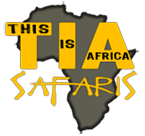Best of Southern Africa Safari
14 Nights, 15 Days • Up to 10 Passengers • 4 – 5 Stars
Windhoek – Etosha South – Etosha East – Maun – Moremi Game Reserve – Chobe River Front – Hwange National Park – Victoria Falls, Zimbabwe

TRIP CODE: WVF2019
INTRODUCTION
Please note that the daily departure times are subject to change due to seasonal variations, as well as unforeseen circumstances. The final decision rests with your guide who will advise you at what time you will be departing each day.
On day 1, there will be a meeting presented by your guide at your lodge. It is imperative to attend this meeting so as not to miss out on any critical information.
Whilst it is our every intention to adhere to the above mentioned itinerary, there may on occasion be a necessity to make alterations in order to make the tour more enjoyable or practical. Therefore please treat the itinerary as a guide only.
Transport:
We use suitable vehicles with comfortable seating, large windows for game viewing, a music and PA system and air -conditioning. All main travelling bags are carried on the vehicle or trailer roof racks to ensure maximum comfort in the vehicle. Some game drives may be conducted in open-sided safari vehicles. We will make use of transfer vehicles in-between lodges.
Travelling Times and Distances:
All travelling times are affected by road conditions, border crossings, detours and weather conditions, therefore on certain days travelling times may be longer than anticipated especially where there is a lot of distance to be covered. Please keep in mind that the time it takes to travel 100 km in your home country is not equivalent to the time it takes to travel 100 km on African roads, therefore we encourage you to sit back and enjoy the spectacular scenery Africa has to offer. Where possible additional stops will be made to ensure you’re travelling comfort at all times.
Accommodation:
Accommodation is situated either in national parks, on the banks of a river, or in other places of interest. The accommodation will be a mix of lodges, chalets and tented camps with en-suite bathrooms.
Meals:
Please advise us of any special dietary requirements in advance.
Visas:
The onus is on the client to organize all visas required to visit the countries stated on the itinerary. Please note that travellers entering Botswana will be required to present a valid international health certificate of vaccination for yellow fever should they originate from or have travelled through countries which have been declared yellow fever infected areas within the preceding 6 months.
Travel Insurance:
Please note that travel and cancellation insurance is mandatory for every guest travelling with TIA Safaris. All insurance is solely the responsibility of our guests. Please ensure you arrange your own insurance with protection for the full duration of your journey to cover personal injury, damage and loss of personal items including but not limited to camera equipment and other electronic items, medical expenses, repatriation expenses and loss of luggage, etc. Please speak to your travel agent if you require assistance.
ACCOMMODATIONS
| Accommodation | Destination | Basis | Duration |
| The Elegant Guesthouse | Windhoek | B&B | 1 Night |
| Toshari Lodge (Etosha Gateway) | Etosha Shouth | D, B&B | 1 Night |
| Emanya @ Etosha Game Lodge | Etosha East | D, B&B | 1 night |
| Nunda River Lodge | Mahango Game Reserve | D, B&B | 1 Night |
| Thamalakane River Lodge | Maun | D, B&B | 1 Night |
| Delta Camp | Moremi Game Reserve | FI | 2 Nights |
| Mogotlho Safari Lodge | Moremi Game Reserve | FB | 2 Nights |
| Chobe Safari Lodge | Chobe River Front | D, B&B | 2 Nights |
| Elephant’s Eye, Hwange | Hwange National Park | FB | 2 Nights |
| Ilala Lodge | Victoria Falls, Zimbabwe | B&B | 1 Night |
Key
B&B: Bed and Breakfast
D, B&B: Dinner, Bed and Breakfast
FB: Dinner, Bed, Breakfast and Lunch
FI: Fully Inclusive
ITINERARY
Day 1: The Elegant Guesthouse, or similar (OS) Windhoek
Windhoek
Windhoek is Namibia’s capital, home to an international airport and a plethora of restaurants, shops, entertainment venues and accommodation options. The city is clean, safe and well-organised, with a colonial legacy that is reflected in its many German eateries and shops, and the widespread use of the German language. Windhoek has an interesting mix of historical architecture and modern buildings, many of which are worth a look, including the Alte Feste (Old Fort), the 1896 Christuskirche (Christ Church), and the more contemporary Supreme Court.
Overnight: The Elegant Guesthouse
Situated in the up-market residential area of Klein Windhoek, corner of “von Eckenbrecher – Ziegler Street” in Klein Windhoek, 5 minutes walk to Joe’s Beerhouse (Africa’s most famous Pub/Restaurant. This modern, up-market Guesthouse consists of 6 luxurious en-suite double rooms and a fully equipped boardroom. Guests can indulge in the contemporary flair and stylish surroundings of The Elegant Guesthouse.
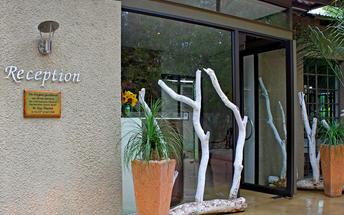

Included
Arrival Group Transfer (Clients arriving at different times to the group transfer will be charged an additional supplement)
Excluded
Lunch, Dinner – Own Account
Day 2: Toshari Lodge (Etosha Gateway), (OS) Etosha South
Etosha South
Located just south of the boundary of Etosha National Park in northwestern Namibia, Etosha South makes up the southern region of this wild paradise. Ogava Private Game Reserve shares the southern boundary with Etosha National Park and offers an array of luxury lodges overlooking picturesque landscapes dotted with abundant wildlife. The national park can be accessed via the southern entrance at Andersson’s Gate. Visitors can catch a glimpse of a variety of wildlife including: lion, giraffe, elephant, white and black rhino, and a multitude of plains game. Popular activities include: game drives, tracking rhinos on foot, guided nature walks, or watch the sunset over this magnificent landscape.
Overnight: Toshari Lodge (Etosha Gateway)
Nestled on an outcrop of dolomite rocks, under a forest of Mopane and white Seringa trees, Toshari Lodge offers affordable but enchanting accommodation close to Etosha National Park. A warm welcome awaits you complimented by a refreshing cold drink on arrival. Absorb the peace and tranquility of the natural African bush as you amble through a blend of manicured lawns and rustic bush gardens to your private room. Take a refreshing dip in the sparkling pools and enjoy wholesome Namibian cuisine, complimented with herbs and vegetables from the garden and fresh home baked bread, in the tranquility of the striking African Lapa with its stunning photographs of local Etosha wildlife. Campsites are also available; each pitch having a private shower room with hot and cold water, 220v power point, herb garden and braai place. Situated just off the C38 between Outjo and Okaukuejo, Toshari Lodge is ideally positioned for day visits into Etosha National Park; on your own or on the expertly guided tours.
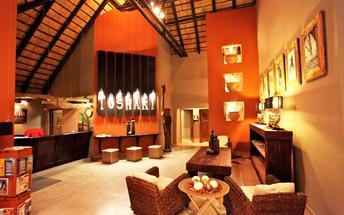
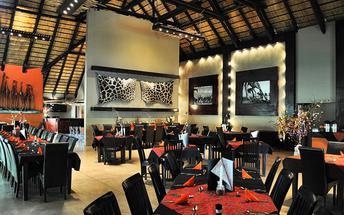
Included
Transfer to Toshari Lodge, Breakfast, Lunch, Dinner
Day 3: Emanya@Etosha Game Lodge, (OS) Etosha East
Etosha East
Located in Northwestern Namibia, Etosha East is a protected sanctuary in the eastern part of the world-renowned Etosha National Park, known as one of the most accessible game reserves in Southern Africa. Etosha East boasts vast open plains scattered with semi-arid savannah grasslands dotted with watering holes and secluded bush camps. An impressive 5000-square-kilometre Etosha salt pan makes up a large area of the eastern side of the park and can even be seen from space. This remote area teems with abundant wildlife such as lions, elephants, black rhinos and giraffes, as well as a variety of birdlife featuring flamingos, ostriches, eagles, hornbills, and owls.
Overnight: Emanya@Etosha Game Lodge
In Namibia, you will discover African luxury. Emanya@Etosha is a 5-star safari lodge situated a mere 20 minutes’ drive from the renowned Etosha National Park – the ultimate African wilderness experience. Twenty-seven major species of game roam this Namibian nature reserve, making Emanya@Etosha the ideal get-away for a safari holiday. Here, you are always surrounded by views of nature. Explore the warm soul of the African bush from the supreme comfort of your sumptuous accommodation, and participate in our Etosha Safari Drives early morning, bird-watching safaris and game drives at sunset or after dark. Privately owned, Emanya@Etosha accommodates up to 40 people, and offers the ideal conference facilities as well as an idyllic wedding venue overlooking a waterhole. Allow us to spoil you with a foot massage upon your return from a game drive in Etosha – in fact surrender yourself to 24-hour pampering. Taste superior wines in our wine cellar, and enjoy the scrumptious meals of master chefs – privately, if you prefer. Discover true rejuvenation at our foot spa, and luxuriate beside the limpid pool at sunset. Lose yourself in complete tranquillity, and find the true spirit of Namibia.
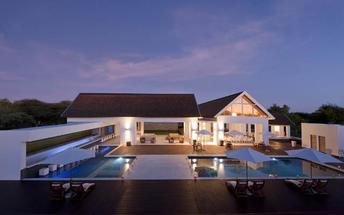
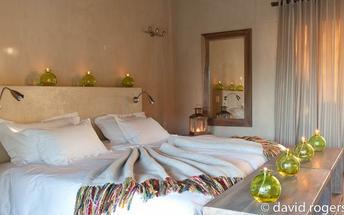
Etosha National Park
The Etosha National Park is Namibia’s premiere game viewing experience, situated in the northwest of Namibia and is an area well known for its wildlife. Vegetation ranges from dense bush to open plains attracting a diversity of wildlife. In the heart of the Park is The Etosha Pan – a shallow depression that covers an area of 5000sq kilometres. Dry and shimmering for most of the year, the pans fill up with water after good rains to a depth which is seldom deeper than 1m. In the dry season wildlife is attracted to perennial springs and waterholes that makes for excellent game viewing. Within the park are three large public rest camps catering for the more budget orientated traveller. There are several smaller establishments on the outskirts of the park on private land offering a more intimate and comprehensive experience. All of these establishments offer excellent value for money.
Included
Full Day Game drive in Etosha National Park (Includes park entry fees) – Game drive will be through the park to Emanya Lodge, Breakfast, Lunch, Dinner
Day 4: Nunda River Lodge, (OS) Caprivi
Overnight: Nunda River Lodge
Nunda River Lodge is situated on the banks of the Kavango River in the lush region of the Caprivi in the north-east of Namibia. It is an ideal base to explore this area as it is close to both Popa Falls and Mahango National Park. Activities include game drives into the park, boat cruises on the Kavango, fishing, mokoro canoe trips and guided walks to a nearby traditional village.
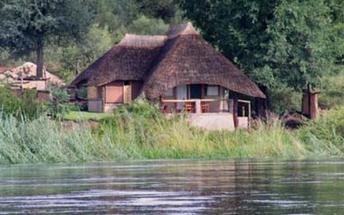
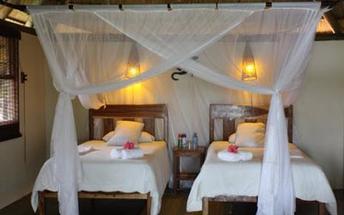
Included
Transfer to Nunda River Lodge, PM Boat Cruise, Breakfast, Lunch, Dinner
Day 5: Thamalakane River Lodge, (OS) Maun
Maun
Set on the banks of the beautiful Thamalakane River in northern Botswana, Maun is the third largest town in this spectacularly scenic southern African country. Maun is the starting point for most expeditions into the Okavango Delta and as a result, has developed into a bustling metropolis that is considered Botswana’s tourism capital. Area attractions include a renowned riverboat that offers cruises up and down the Thamalakane River; the forest groves of the Maun Game Reserve; and Moremi Game Reserve, home to hippos, lions and rhinos. Maun also serves as the jumping off point for many safaris and air charters as well as offers 4x4 rentals. Don’t miss the Nhabe Museum exhibiting the local history, art and culture of the Ngamiland region.
Overnight: Thamalakane River Lodge
Thamalakane River Lodge is ideally located an easy 20-minute drive from Maun Airport en route to the famous Moremi Game Reserve. It is a secluded haven of tranquility nestled in a grove of mature riverine trees on the bank of the Thamalakane River. The rambling lodge has an idyllic setting and is committed to service excellence. Character en-suite stone chalets, some with private splash pools are positioned in the shade of the riverine forest, overlooking the river. All chalets and common areas have terraces that take advantage of the serene 180 degree view of the riverbanks lined with fluttering reeds visited by an ever changing array of water fowl and birds. It is a delightful place to come home to after a day spent exploring.
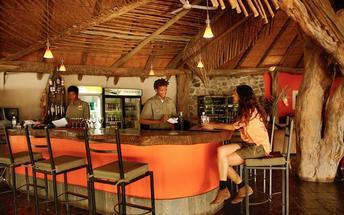

Included
Transfer to Thamalakane River Lodge, Breakfast, Lunch, Dinner
Day 6: Delta Camp, (OS) Moremi Game Reserve
Moremi Game Reserve
Situated in the east of the Okavango Delta, Moremi Game Reserve ranks as one of the most beautiful reserves in Africa. It covers more than 4871 square kilometres of pristine wilderness, and the varied terrain includes savannah, winding waterways, and dense forest. This diverse ecosystem supports an incredibly wide spectrum of wildlife, ranging from large herds of buffalo, wildebeest and zebra, to the rare sitatunga and lechwe antelope, lion, cheetah and packs of wild dog in the open grasslands. The birdlife is prolific and includes most of the 550 bird species recorded on Botswana’s national bird list. A range of luxury lodges in the reserve offers visitors the perfect base to experience this corner of paradise.
Overnight: Delta Camp View iBrochure
Situated on the South Western edge of Chief’s Island in the heart of the Okavango Delta is Delta Camp – set in the forest of a large, beautiful and palm-studded island. The Okavango Delta with its crystal-clear channels, lagoons, sweeping floodplains and countless islands, is home to over 450 bird species, a spectacular array of plant species and the full spectrum of African game – the Okavango has earned its reputation as one of the world’s premier wilderness areas. The focus is on peace and tranquillity (stalking game on foot provides all the excitement one could wish for) and guests are actively encouraged to visit the local village, home to the guides, and to interact with the people there. Accommodation is for a maximum of 16 guests in spacious lethaka (reed) chalets with en-suite bathrooms. Built of natural materials and elevated off the forest floor, each chalet has hot and cold running water, a shower with a view and solar-powered electric lighting.
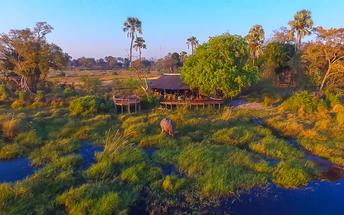
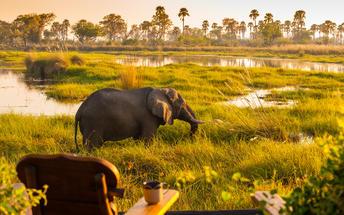
Included
Air Transfer to Delta Camp, Activities included at the lodge, Breakfast, Lunch (if time allows), Dinner
Included Activities: Mokoro trips, Private guided walks, Cultural interaction at an authentic baYei village
Day 7: Delta Camp, (OS) Moremi Game Reserve
Included
Activities included at the lodge, Breakfast, Lunch, Dinner
Included Activities: Mokoro trips, Private guided walks, Cultural interaction at an authentic baYei village
Day 8: Mogotlho Safari Lodge, (OS) Moremi Game Reserve
Overnight: Mogotlho Safari Lodge
The Mogotlho Safari Lodge takes it have from the Camel thorn trees that grow along the banks of the Khwai River. The lodge’s large thatch roofed dining and lounge area leads out onto an elevated viewing deck overlooking the riverbank. Spectacular African sunsets can be admired over sundowners from the quaint bar or from the deck of your comfort en-suite tent.
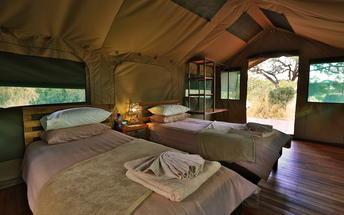

Included
Air Transfer to Maun, Transfer to Mogothlo Safari Lodge, PM Game drive on concession, Breakfast, Lunch, Dinner
Day 9: Mogotlho Safari Lodge, Moremi Game Reserve
Included
Full Day Game drive (Includes park entry fees), Breakfast, Lunch, Dinner
Day 10: Chobe Safari Lodge, (OS) Chobe River Front
Chobe River Front
The Chobe River forms the northern boundary of the Chobe National Park, renowned for its reliable and diverse game viewing. Safaris are conducted both by boat and on land. This section of the park is best known for its elephant and hippo populations but the waters attract all manner of game including large herds of buffalo and the lions that prey on them.
Overnight: Chobe Safari Lodge View iBrochure
Chobe Safari Lodge is situated in Kasane on the banks of the Chobe River and shares a border with Chobe National Park. Right on the doorstep is the meeting of four African countries: Botswana, Namibia, Zimbabwe and Zambia. Chobe Safari Lodge therefore offers an excellent getaway location to Chobe, Victoria Falls or Caprivi. The close proximity to Victoria Falls International Airport, Livingstone International Airport and Kasane International Airport makes it easily accessible, with daily road transfers or charter flights connecting all these airports with Chobe Safari Lodge. The lodge has been recently renovated; matching a magical lodge experience to the spectacular game viewing.
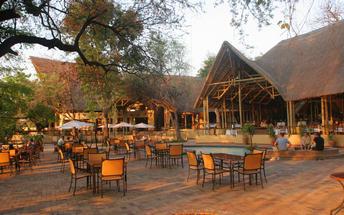
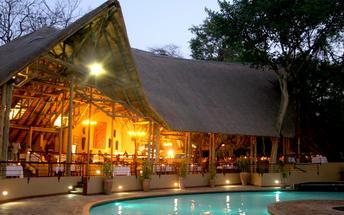
Included
Transfer via Savute to Chobe Safari Lodge, Breakfast, Lunch, Dinner
Day 11: Chobe Safari Lodge, Chobe River Front
Chobe Safari Lodge Game Drive
Chobe Safari Lodge Game Drive offers guests the opportunity to view abundant species of animal life including elephants up close. There is also the possibility of encountering a large predator. The game drives have three departure times during the time, which all have a duration of approximately three hours. Alternative arrangements can be made to book either a half or full day drive with a picnic lunch.
Chobe Safari Lodge Boat Cruises
Chobe Boat Cruises are a wonderful way to experience the Chobe National Park. Herds of elephants can be seen crossing the Chobe river into the island which is a spectacular sight to witness. Other animal species such as hippos and crocodiles can be seen lounging in the sun by the riverside.
The boat cruises are available in a number of different options. The standard cruise boards approximately 30-40 people. The bigger boats feature a bar on board for refreshments while the smaller boats are perfect for bird watching. Boat cruises depart from the town of Kasane at either the morning or afternoon departures. A private boat cruise can be arranged for alternate times.
Included
AM Chobe Safari Lodge Game Drive, PM Chobe Safari Lodge Boat Cruise (Includes park entry fees), Breakfast, Dinner
Excluded
Lunch – Own Account
Day 12: Elephant’s Eye, (OS) Hwange, Hwange National Park
Hwange National Park
Hwange National Park is the largest reserve in Zimbabwe and is home to a variety of wildlife, including giraffes, lions, zebras and about 40 000 elephants. It is also a protected region for endangered species. The area stretches from sandy dunes and savannahs through to rocky terrain and forests. Visitors can choose between game drives, guided tours and horseback safaris to explore the park and its wildlife.
Overnight: Elephant’s Eye, Hwange View iBrochure
The best Zimbabwe has to offer: Elephant’s Eye, Hwange offers an unforgettable experience with the African wilderness – in an intimate and welcoming setting. Elephant’s Eye, Hwange is located on a private concession (about 6000 ac), which is only 13 km from the entrance to Hwange National Park. Attention to detail and friendly service in the heart of the African bush will put you at ease, as you escape the noise and bustle of the modern world. Enjoy the quiet, beautiful views overlooking a waterhole, that is frequented by elephants and other game, allowing you to feel at one with nature. The camp comprises of 8 tented chalets. Every chalet has a double or twin beds surrounded by mosquito netting and with an en-suite bathroom with a bath and basin, glam outside shower and wrap-around veranda. The Elephant’s Eye Hwange lodge can host a maximum of 16 people at any given time and all meals and most drinks are included. This authentic, modern African lodge is designed to meet your needs with style and excellent service, setting a high standard for the discerning traveler.
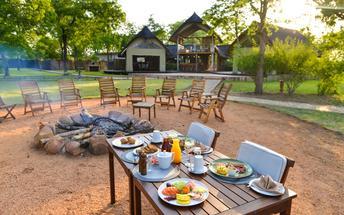
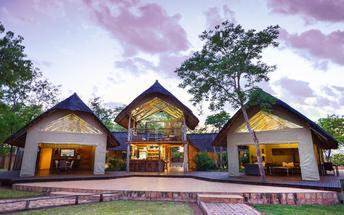
Included
Transfer to Hwange, PM Game drive on concession, Breakfast, Lunch, Dinner
Day 13: Elephant’s Eye, Hwange, Hwange National Park
Included
Full Day Game drive in Hwange National Park (Includes park entry fees), Breakfast, Lunch, Dinner
Day 14: Ilala Lodge, (OS) Victoria Falls, Zimbabwe
Victoria Falls, Zimbabwe
Resting on the southern banks of the Zambezi river at the western end of the eponymous falls, this popular tourist town is compact enough to walk around and makes an ideal base for travellers exploring the seventh wonder of the world, the unfathomably vast Victoria Falls. About two thirds of the falls can be viewed from the Zimbabwean side and, while the falls are undoubtedly the star attraction, the area provides both adventure seekers and sightseers with plenty of opportunities to warrant a longer stay. Popular activities include scenic flights over the falls in helicopters or micro lights, bungee jumping off the Victoria Falls Bridge, white-water rafting (seasonal), and day trips to Chobe National Park. The town itself offers some excellent accommodation and restaurant options as well as an eclectic variety of African curios and authentic art sold by friendly Zimbabwean locals who are wonderfully welcoming and eager to help you enjoy your stay.
Overnight: Ilala Lodge View iBrochure
The warmest of welcomes awaits you at Ilala Lodge Hotel. A gracefully distinguished ambiance. Attentive yet discrete service that always comes with a smile. The sublime surroundings of our boutique hotel will reawaken your senses while the power of the majestic Victoria Falls renews your spirit. Relax in luxurious style. Listen to the meditative rhythm of the great Zambezi as you drift off to sleep.As morning comes, gently awake and lift your head to see the spray of the majestic Victoria Falls across the unspoiled horizon – and let your soul sigh. Feel at ease in our elegant and spacious rooms with African Teak furniture, soft, crisp linen – all en-suite facilities, bathroom with separate shower, air conditioning, overhead fan, satellite TV, hair dryer, tea & coffee making facilities, free WiFi and a safe. 56 rooms in total including 2 Executive Suites, 2 Standard Suites, 20 Deluxe rooms and 32 Standard rooms. The view from your room looks across the lawns to the National Parks where elephant, warthog, impala or the occasional buffalo might be passing by or simply grazing on the lawn or in the tree line. Experience new tastes, indulge in unusual flavours and enjoy delectable dishes at our award winning restaurant “The Palm”; dine in view of the spray of the majestic Victoria Falls! We have a tours desk in the hotel where you can book all you’re activities. Ilala Lodge also has a spa, where you can spoil yourself after that long safari! Cruise down the river of time and follow the route that ancient explorers took, on the luxurious Ra-Ikane. She is the only one of her kind in Victoria Falls; The Ra-Ikane is a small luxury cruise boat that is out-fitted to suggest, in exquisite detail, an ambiance of a bygone era. Sip chilled white wine, or Gin & Tonics whilst nibbling on canapes, as well as the sumptuous high tea, whilst you glide up to Elephants feeding on the shoreline.
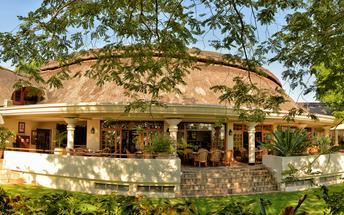

Victoria Falls Guided Tour
A view of the Victoria Falls is something you will never forget and the best way to see them is on a guided tour. Discover how the Falls were formed and what local customs and traditions surround them. These tours are extremely informative and end with a visit to the local art and crafts centre.
Included
Transfer to Victoria Falls, Victoria Falls Guided Tour (Zimbabwean Side), Breakfast
Excluded
Lunch, Dinner – Own Account
Day 15: End of Itinerary
Today marks the end of your safari as you are transferred to the airport for your onward flight.
Included
Breakfast
Excluded
Lunch, Dinner
TRAVEL INFORMATION

Despite recent and surprisingly rapid modernization, Botswana’s cities provide little in the way of tourist attractions. However, what the cities lack in excitement, the surrounding wilderness areas more than make up for in outstanding natural beauty. The country’s primary tourist draw card is undoubtedly the vast red expanse of the Kalahari desert and its remarkably beautiful Okavango Delta – the largest inland delta in the world provide a haven for an abundance of African wildlife. Other highlights include the impressive Makgadikgadi salt pans where visitors are privy to massive zebra migrations during the flood season; the Savuti plains which host large prides of lions; and the Tsodilo Hills where 4500 rock paintings form a unique record of human settlement over many millennia.
Currency
Botswana’s currency is Pula (which means ‘rain’ in Setswana). It is divided into 100 thebe (which means ‘shield’ in Setswana). Travellers’ cheques and foreign currency may be changed at banks, bureaux de change and authorised hotels.
The US dollar, Euros, British Pound and the South African Rand are the most easily convertible currencies (and accepted by some estabishments – but, generally, then an inflated rate of exchange will be applied).
Banking
Seven main commercial banks, as well as a number of foregin exchange bureaux, operate in Botswana. Operating hours are Monday to Friday 08h30 to 15h30 and Saturday 08h30 to 10h45.
Full banking services are available in major towns, although ATMs are sprouting up all over the country. Most credit cards are accepted at hotels and restaurants. Cultural sites and community art and craft outlets usually only accept cash.
Travel, Transport and Getting Around
Public transport in Botswana is geared towards the needs of the local populace and is confined to main roads between major population centres. Although cheap and reliable, it is of little use to the traveller as most of Botswana’s tourist attractions lie off the beaten track.
Driving off the main roads in Botswana is only recommended to expects in 4x4 vehicles, that are equipped correctly. Most lodges offer transfers or they can be arranged. If, however, you will be driving in Botswana: your home driving licence will be accepted (with an official English translation if necessary; driving is on the left side of the road; and the national speed limit is on tarred roads is 120km/h and 60km/h in towns and villages.
Be sure to watch out for wild animals on the roads!
There are major airports in Maun, Kasane and Gaborone, while smaller charter flights are used to get to the other top attractions and camps.
Food, Drink and Cuisine Advice
Tap water is considered safe to drink, although outside main cities and towns, visitors are advised to check first and sterilise water if in any doubt. Bottled water is available in most tourist centres. Filtered water is available at most camps and shops offer bottled water – it is advised to be well stocked of bottled water if you are travelling off the beaten track. Milk is pasteurised, and dairy products, local meat, poultry, seafood, fruit and vegetables are generally safe.
Safari lodges and camps serve international-style cuisine, generally of an extremely high standard, along with local beer and imported wine and spirits. Good restaurants and bars can be found in main towns, often within hotels. Beef and goat are very popular meats. Elsewhere, food is more basic: millet and sorghum porridge are the local staples.
A discretionary 5 to 10% tip is typical for restaurant bills. In many places, a service charge is automatically added. It is customary to tip the game guide and lodge staff while on safari.
Climate and Weather
Botswana’s climatic pattern is typical of southern Africa, although its rainfall is less than countries further east. The rains in Botswana come mostly between December and March, when average minimum temperatures are in the low 20°s. Some days will be bright and sunny, some will have afternoon thunderstorms, and some will just be grey.
As with Namibia, April and May in Botswana are generally lovely, with the sky clear and the landscape green. Night temperatures start to drop during these months, especially in the Kalahari. Note that places in and around the Okavango tend to have less extreme, more moderate temperatures than the drier areas of the Kalahari.
From June to August the night-time temperatures in drier areas can be close to freezing, but it warms up rapidly during the day, when the sky is usually clear and blue. It’s now very much ‘peak season’ for most safari areas: the land is dry in most areas so the animals congregate around the few available water sources.
This continues into September and October, when temperatures climb again, drying the landscapes and concentrating the game even more. This is the best time for big game safaris – although October can feel very hot, with maximum temperatures sometimes approaching 40°C.
November is difficult to predict, as it can sometimes be a continuation of October’s heat, whilst sometimes it’s cooled by the first rains; it’s always an interesting month.
Clothing and Dress Recommendations
In summer, lightweight, light coloured cottons are preferable. Avoid synthetic materials and black clothing, as they increase perspiration and discomfort. In winter, wear trousers, long sleeved shirts / blouses and jerseys. From May – August, night temperatures can fall below zero degrees celsius, so warm jerseys and jackets are vital, especially on morning and evening game drives. Garments of neutral colours that blend with the bush and forest are advisable for safaris and game viewing. Bring a lightweight jacket and/or jersey for unexpected temperature changes or rain. Closed, comfortable walking shoes or gym shoes are a must in all seasons. Special attention should be given to protection from the sun. Bring a sunhat, good quality sunscreen, sun lotion and polarised sunglasses. Wide brimmed sun hats are essential.
Electricity and Plug Standards
Electrical sockets (outlets) in Botswana are the “Type M ” South African SABS1661 (“Large” 15 amp BS-546) sockets. This is actually an old British standard. The “Type M ” South African plug and socket is not to be confused with the “Type D ” Indian plug and socket. In pictures, they look very similar, but the South African type is much larger than the Indian type, and they are physically incompatible. If your appliance’s plug doesn’t match the shape of these sockets, you will need a travel plug adapter in order to plug in. Travel plug adapters simply change the shape of your appliance’s plug to match whatever type of socket you need to plug into.
Electrical sockets (outlets) in Botswana usually supply electricity at between 220 and 240 volts AC. If you’re plugging in an appliance that was built for 220-240 volt electrical input, or an appliance that is compatible with multiple voltages, then an adapter is all you need.
But travel plug adapters do not change the voltage, so the electricity coming through the adapter will still be the same 220-240 volts the socket is supplying. If you need to use appliances that are not compatible with 220-240 volt electrical input, you will need a voltage converter.

A nation of spectacular natural beauty, friendly people and rich culture, Zimbabwe’s status as one of Africa’s leading safari destinations was dampened for years by its political instability. But now that the country is transcending its strife and returning to a state of equilibrium, it is once again emerging as a vacation highlight of the continent. Victoria Falls – known to locals as ‘The Smoke That Thunders’ – is one of the seven natural wonders of the world and the sheer power of this massive body of water plunging into the Zambezi Gorge is awe-inspiring and unforgettable. Lake Kariba, with its game-rich shores and islands, is an idyllic safari spot featuring mind-blowing sunsets; Hwange National Park is known for its huge herds of elephants; and a kayak trip down the Zambezi through the Mana Pools National Park will appeal to the intrepid traveller, providing close encounters with crocodiles, hippos and a host of other wildlife.
Currency
Zimbabwe uses US$ as well as its own unit of currency, the Zimbabwe Bond Dollar. It is advised to carry small denominations of change with you, however it is best to pay for as much as possible outside of the country. US$ work best and are widely accepted in supermarkets, and for curios, accommodation, activities and gratuities. South African Rand and Euros are only accepted in some places in Victoria Falls. Do not plan on being able to use cash machines in Zimbabwe to draw money. Before leaving home please exchange all the money that you will need for your trip, plus extra, into US$. Most of this should be in 1, 5, 10 and 20 denominations because change is not always available. In an emergency you can try Barclays Bank, Stanbic Bank or Standard Chartered Bank as they will infrequently accept foreign debit cards for withdrawing cash.
Banking
Banks in Zimbabwe are open for business Monday, Tuesday, Thursday and Friday from 08h00 to 15h00, on Wednesdays from 08h00 to 13h00 and Saturdays from 08h00 to 11h30. They are closed on Sundays and Public Holidays.
Only VISA and MasterCard are accepted in Zimbabwe, however it should be noted that very limited facilities will have credit card machines, and the connection is not always reliable so it is advisable to carry cash as back up.
Travel, Transport and Getting Around
Taxis are safe and reliable, and can be booked through your hotel front desk. Taxis in cities travel within a 40km radius of the city. Always take a taxi at night.
Major airlines fly into Victoria Falls, Harare and Bulawayo. Charter flights are available to most attractions and camps.
Zimbabwe has a good road infrastructure, by African standards, although potholed. Between major towns, there are frequent road blocks. Traffic drives on the left side of the road.
If you are driving yourself around Zimbabwe, be sure to check on fuel availability in advance. If you are covering long distances within the country, ensure you carry extra fuel in 5 or 10lt metal containers in case of emergency. Fuel is generally available, but supply can fluctuate. Fuel is only available for cash.
Food, Drink and Cuisine Advice
Zimbabwe’s native cuisine is based on sadza, a cooked porridge made from ground maize which is normally be accompanied by some tasty relish, perhaps made of meat and tomatoes, or dried fish. Safari camps will often prepare sadza if requested, and it is almost always available in small restaurants in the towns.
Camps, hotels and lodges that cater to overseas typically serve a variety international fare, and the quality of food prepared in the most remote bush camps is usually excellent.
If you are driving yourself around and plan to cook, then get most of your supplies in main towns. There are a number of South African shopping chains operating in Zimbabwe which will generally have all that you will need.
Water in the main towns is usually purified.. The locals drink it, and are used to the relatively innocuous bugs that it may harbour. If you are in the country for a long time, then it may be worth acclimatizing yourself to it. However, if you are in Zimbabwe for just a short period of time, then try to drink only bottled, boiled, or treated water available in towns and from all camps, lodges and hotels.
Climate and Weather
In Zimbabwe, the rains come principally in December, January,February and March; the further north you are, the earlier the precipitation arrives and the later it leaves. Zimbabwe’s higher eastern areas usually receive more rainfall than the lower-lying western ones.
By April and May most of the rain is gone, leaving a verdant setting, which is starting to dry out. Especially in more southerly and higher locations, the night-time temperatures start to drop.
The nights in June, July and August become much cooler, so don’t forget to bring some warmer clothes, in case you want to spend an evening outside; the days are still clear and warm. For Zimbabwe, this is the start of the ‘peak season’– days are often cloudless and game sightings continually increase.
Into September and October the temperatures rise once again: Zimbabwe’s lower-lying rift valley – Mana Pools – can get very hot in October. During this time, you’ll see some fantastic game, as the Zimbabwe’s wildlife concentrates around the limited water sources.
November is unpredictable; it can be hot and dry, it can also see the season’s first rainfalls – and in this respect it’s a very interesting month, as on successive days, you can see both weather patterns.
Clothing and Dress Recommendations
When in Zimbabwe the cardinal rule is to wear casual, comfortable clothes during the day as temperatures can get very hot. It is advisable to wear light loose fitting clothing, such as cotton or linen, as they are cool and easy to wash. Warmer clothes are advised for the evenings and rainwear for the wet season.
A brimmed hat and sunglasses are a good idea year round. Long sleeved shirts and long trousers will also guard against the scorching sun rays. It is recommended you wear light shoes, especially if your itinerary entails a lot of walking.
For safaris, please remember to wear appropriate clothing and shoes. Earth colour clothes, such as browns, greens and tans are advisable.
Electricity and Plug Standards
Current is 220/240 volts at 50 cycles per second. Both square and round plugs are used.

With its well-developed infrastructure, some of the best tourist facilities in Africa and an impressive list of breathtaking natural wonders, touring Namibia is truly a pleasure. Visit the capital of Windhoek and the lovely coastal town of Swakopmund to discover remnants of the country’s German influence, reflected in the architecture, culture, cuisine and the annual Oktoberfest celebrations. To properly appreciate this extraordinary country, you will have to venture out of the cities to explore the remarkable natural landscapes Namibia has to offer. These include: the impressive Fish River Canyon Park; the vast Etosha National Park teeming with local subspecies, such as desert lions, desert elephants and the Hartmann’s Mountain Zebra; the hauntingly beautiful Kalahari Desert; and of course the Namib Desert stretching for nearly 1000 km along the magnificent Atlantic coastline. Namibia is an ideal destination for travellers seeking an unforgettable African experience in a uniquely beautiful untamed wilderness.
Currency
Namibia uses the Namibian Dollar (N$) this is linked on a one to one exchange with the South African Rand. The Rand is legal tender in Namibia, but the N$ cannot be used in South Africa.
If you are wishing to purchase currency before arriving in Namibia, it is easiest to buy Rand as the Namibian Dollar is seldom available in banks outside of Namibia.
Banking
Banks are found in most towns, and are generally open from 09h00 to 15h30 on weekdays and 08h30 to 11h00 on Saturdays. Closed on Sundays and public holidays. Most of them offer foreign exchange services – with cash, bank and credit cards as well as travellers cheques.
You can also obtain cash from many of the ATMs. Several international banks have branches in main city centres. Always advise your bank that you are travelling outside of the country as they might block your purchases if they have not been informed.
Travel, Transport and Getting Around
Public transport in Namibia is geared towards the needs of the local populace, and is confined to main roads between major population centres. Although cheap and reliable, it is of little use to the traveller as most of Namibia’s tourist attractions lie off the beaten track.
It is easy to travel around Namibia by car, and a 2WD vehicle is perfectly adaquate for most journeys. However, long distances, poor mobile phone coverage outside of main towns and infrequent petrol stations that only accept cash mean that planning ahead is vital.
There are major airlines that fly into Windhoek and Swakopmund. Other destinations are reachable by car or charter flight.
Namibians drive on the left and all signposts are in English. Seat belts must be worn at all times and talking in a mobile phone while driving is prohibited. The general speed limit is 120km/h on tarred roads outside of towns and 100km/h on gravel roads. In built up areas, the speed limit is 60km/h.
Food, Drink and Cuisine Advice
Traditional Namibian cuisine is rarely served and so the food at restaurants tends to be European in style and is, generally, of a very high standard.
Namibia is very meat-orientated, and many menu options will feature steaks from various animals. However, there is usually a vegetarian and seafood section offered by most camps and restaurants.
In the supermarkets you’ll find pre-wrapped fresh fruit and vegetables (though the more remote the areas you visit, the smaller your choice), and plenty of canned foods, pasta, rice, bread, etc. Most of this is imported from South Africa.
The water in Namibia’s main towns is generally safe to drink, though it may taste a little metallic if it has been piped for miles. Natural sources should usually be purified, though water from underground springs and dry riverbeds seldom causes any problems. However, filtered and bottled water are readily available in most towns and all camps, lodges and hotels.
Climate and Weather
Partially covered by the Namib Desert, one of the world’s driest deserts, Namibia’s climate is generally very dry and pleasant – it’s fine to visit all year round. Namibia only receives a fraction of the rain experienced by countries further east. Between about December to March some days will be humid and rain may follow, often in localised, afternoon thunderstorms. These are more common in the centre and east of the country, and more unusual in the desert.
April and especially May are often lovely months in Namibia. Increasingly dry, with a real freshness in the air, and much greenery in the landscape; at this time the air is clear and largely free from dust.
From June to August Namibia cools down and dries out more; nights can become cold, dropping below freezing in some desert areas. As the landscape dries so the game in the north of the country gravitates more to waterholes, and is more easily seen by visitors. By September and October it warms up again; game-viewing in most areas is at its best, although there’s often a lot of dust around and the vegetation has lost its vibrancy.
November is a highly variable month. Sometimes the hot, dry weather will continue, at other times the sky will fill with clouds and threaten to rain – but if you’re lucky enough to witness the first rains of the season, you’ll never forget the drama.
Clothing and Dress Recommendations
Namibians have a somewhat relaxes attitude to dress codes. A jacket and tie is very unusual. In fact, long trousers and a shirt with buttons are often quite adequate for a formal occasion or work wear. A pair of sensible shoes, jeans and a t-shirt is recommended.
During the day it is generally hot, so pack light weight loose fitting clothes in natural fabrics, such linen or cotton, that will keep you cool and are easy to wash and dry.
Avoid blue clothing – the tsetse flies are drawn to the colour blue, and their bite can give you African Sleeping Sickness.
Long sleeved shirts and long trousers will protect you against mosquitoes at night.
Electricity and Plug Standards
Current is 220/240 volts at 50 cycles per second. A three-point round-pin adapter plug should be brought for your electrical appliances. Such adapters are also available at major airports.
